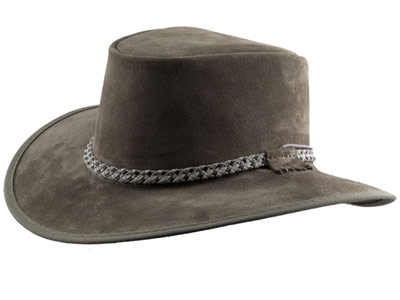
The Man In The Leather Hat
As I stood there in the dusty town square with my back to the Snubbing Post, a violin in my hand, and a gun in my face, I would have rather been just about anyplace else in the world. We had arrived in Colinas early in the morning--José, Benjamin, and I--and had walked through the town and visited every house and business, inviting everyone to a meeting we were planning for that night at the Snubbing Post.
The Snubbing Post was a large log sunk deep into the ground and used by cowboys with wild horses. They would tie their broncos close to it for easier mounting--a process made even more difficult when the rider was half drunk.
The post was also a much-used public utility in this South American town, serving upon occasion as the town jail. Prisoners were secured to it for a night and a day, then released or shot. The post also served as the town newspaper, with notices of public interest being posted there.
When we had asked the Communist mayor for permission to hold our meeting in the square, he had replied, “Certainly.”
“Will you also come?” we asked. “It would be an honor to have you attend.”
“I am too busy.”
“Mr. Mayor,” I continued, “sometimes the boys who have had too much to drink cause some trouble and make a lot of noise. Sometimes they shoot their pistols. Could you give us some police to help keep order tonight?”
The knife-scarred lip of the mayor curled in a cruel grin, and he answered, “If your God cannot protect you, why should I?” He did have a point there, but I did not appreciate his logic.
Come and Listen
When evening began to fall, lamps began to flicker in the bars that surrounded the square. Children played soccer in the sand near the post, and I leaned against it to begin my part of the program.
I played my violin--softly at first, then with more vigor and a little more noise. One violin is not much competition for the noisy loudspeakers that would soon begin to batter the evening stillness from the bars and gambling halls. The ball-players gathered with interest at the post.
“What's going on?” the children asked.
“We have come to give you a great program,” said José. “We have come to tell you wonderful things tonight, and you will want to hear it all.” He got the children singing Christian songs while I played my violin.
Shadows lengthened, and darkness fell rapidly on the square. Mothers, concerned about their children being out after dark, came to see, and most of them stayed. Drinkers in the bars saw women in the street and came out. As the Lord hung His full moon in the sky, bringing soft light to the town square, a crowd of some 200 people gathered at the Snubbing Post.
Using his beautiful voice and warm personality, José soon had the crowd singing and laughing and feeling at home with us. José had been a knife fighter before his conversion to Christ. He knew how to talk with these people. During the singing he gave his testimony, sharing how he had become a Christian and telling of the good things that had followed his decision to surrender his life to God.
Benjamin, a 220-pound former street fighter from the city of Sao Paulo, spoke God's message with beauty, power, and sincerity. He had been a Communist before coming to Christ, and his job in the party had been to start riots in city parks. He also had been active in Communist-led labor unions, and he knew his way around the rough side of life.
Hidden Weapon
Throughout the service, with the circle of children pressing us close to the post, my attention was fixed on the hard countenance of a scar-faced, bearded man with a leather hat pulled low over his forehead. His cold cruel eyes seemed fixed in my direction, causing me great discomfort.
My job that evening was to invite anyone interested in becoming a Christian to come forward for special prayer and additional information. When I gave God's invitation that night, the first to move forward was the man in the leather hat.
The crowd parted, the children made way for him to pass, and he stood before me in grim, threatening silence. The crowd was quiet, and my colleagues were not within my sight. I felt very much alone.
The man's hand moved smoothly into his shirt and came out with a large revolver, which he held steadily trained on me. I thought about any possible moves I could make. The violin in my hand might look good on his head, but any bullet fired at so close a range would not be likely to miss the target.
So I prayed. And as I did I looked into the cold eyes beneath the leather hat and waited for him to make the next move. The words he then spoke became fixed in my memory for life.
“Preacher, see this gun?”
“Si, senior [“Yes, mister”].” I wondered how he thought I could see anything else.
“This gun has gotten me everything I have ever had in life. Without it I am nothing. But I like what I have heard tonight. I'm giving you my gun and want you to sell it and use the money toward building a church here in Colinas. It is not much, but it is all I have.”
And with these simple words, he handed his gun to me.
Paul B. Long